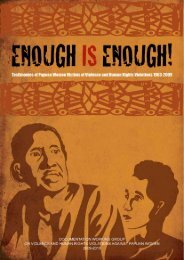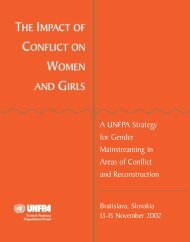Sexual exploitation and abuse by UN peacekeepers - PeaceWomen
Sexual exploitation and abuse by UN peacekeepers - PeaceWomen
Sexual exploitation and abuse by UN peacekeepers - PeaceWomen
Create successful ePaper yourself
Turn your PDF publications into a flip-book with our unique Google optimized e-Paper software.
6<br />
Carlyn van der Mark<br />
Political Science Master Thesis - <strong>Sexual</strong> <strong>exploitation</strong> <strong>and</strong> <strong>UN</strong> <strong>peacekeepers</strong><br />
Allegations of sexual <strong>exploitation</strong> <strong>and</strong> <strong>abuse</strong> are directed towards the women <strong>and</strong> teenage<br />
girls during peacekeeping missions. 1 The continuation of sexual <strong>exploitation</strong> <strong>and</strong> <strong>abuse</strong> is<br />
harmful to the local population <strong>and</strong> is an <strong>abuse</strong> of the position of <strong>peacekeepers</strong> as role models<br />
who are there to serve <strong>and</strong> protect the domestic environment - not to exploit it. The reason it<br />
is important to study the zero tolerance policy is because it appears to be “zero tolerance -<br />
zero compliance” (Clayton, Bone, Dec 23 2004). This thesis shall explore which factors<br />
prevent the zero tolerance policy from being effective. It will do so <strong>by</strong> posing the research<br />
question “what factors explain for the failure of the <strong>UN</strong>‟s zero tolerance policy towards<br />
sexual <strong>exploitation</strong>?”<br />
In order to address the failure of the zero tolerance policy, this thesis shall investigate three<br />
dominant variables for the failure of the zero tolerance policy. Section 1 will explore the<br />
Social Masculinities <strong>and</strong> the peacekeeper, section 2 will discover the problem of immunity<br />
<strong>and</strong> accountability measures whilst section 3 looks at resource allocation <strong>by</strong> examining the<br />
domestic context of the peacekeeping mission. This thesis will explore why the zero tolerance<br />
policy fails <strong>by</strong> examining the flaws of the policy in relation to these three variables. By<br />
exploring these three variables I hope to discover the ineffectiveness of the zero tolerance<br />
policy. I predict the main flaw of the zero tolerance policy is the implementation of a zero<br />
tolerance policy within a peacekeeping culture; making the social masculinities a determining<br />
factor. It is apparent that there is a supply <strong>and</strong> dem<strong>and</strong> cycle towards sexual <strong>exploitation</strong>. The<br />
three variables will highlight why this supply <strong>and</strong> dem<strong>and</strong> cycle persists. This thesis shall<br />
begin with a literature review on explaining reasons for sexual <strong>exploitation</strong> <strong>and</strong> <strong>abuse</strong> in<br />
peacekeeping missions which causes for a failure of the zero tolerance policy. The research<br />
design framework will then highlight how this thesis is structured in examining the failure of<br />
the zero tolerance policy, followed <strong>by</strong> section 1,2,3 <strong>and</strong> finally a conclusion.<br />
1 Women <strong>and</strong> teenage girls are not the only victims of sexual <strong>exploitation</strong> <strong>and</strong> <strong>abuse</strong>. There have been<br />
numerous cases of boys being exploited <strong>by</strong> <strong>peacekeepers</strong>. However, this thesis will focus only on women <strong>and</strong><br />
teenage girls. It is important to note that children below 11 years old have also been involved in sexual<br />
<strong>exploitation</strong>. However, to include ‘women <strong>and</strong> children’ infantilizes women involved with sexual <strong>exploitation</strong><br />
(Enloe, 2000). This thesis shall use women <strong>and</strong> teenage girls as points of reference for allegations of sexual<br />
<strong>exploitation</strong>. Teenage girls refer to girls who are in their adolescent years, from 12 years onwards. The reason<br />
for using the term “teenage girls” is because referring to girls above 12 as children infantilizes them.<br />
Furthermore, the society they live in hardly categorizes them with a child-like innocence. It is important to<br />
hear their stories as well.




![IANSA [PDF, 2MB] - PeaceWomen](https://img.yumpu.com/25206379/1/190x123/iansa-pdf-2mb-peacewomen.jpg?quality=85)
![Commitments Sample [PDF, 93KB] - PeaceWomen](https://img.yumpu.com/25206331/1/190x245/commitments-sample-pdf-93kb-peacewomen.jpg?quality=85)










![A Toolkit for Advocacy and Action [PDF, 260KB] - Peace Women](https://img.yumpu.com/25205989/1/190x245/a-toolkit-for-advocacy-and-action-pdf-260kb-peace-women.jpg?quality=85)